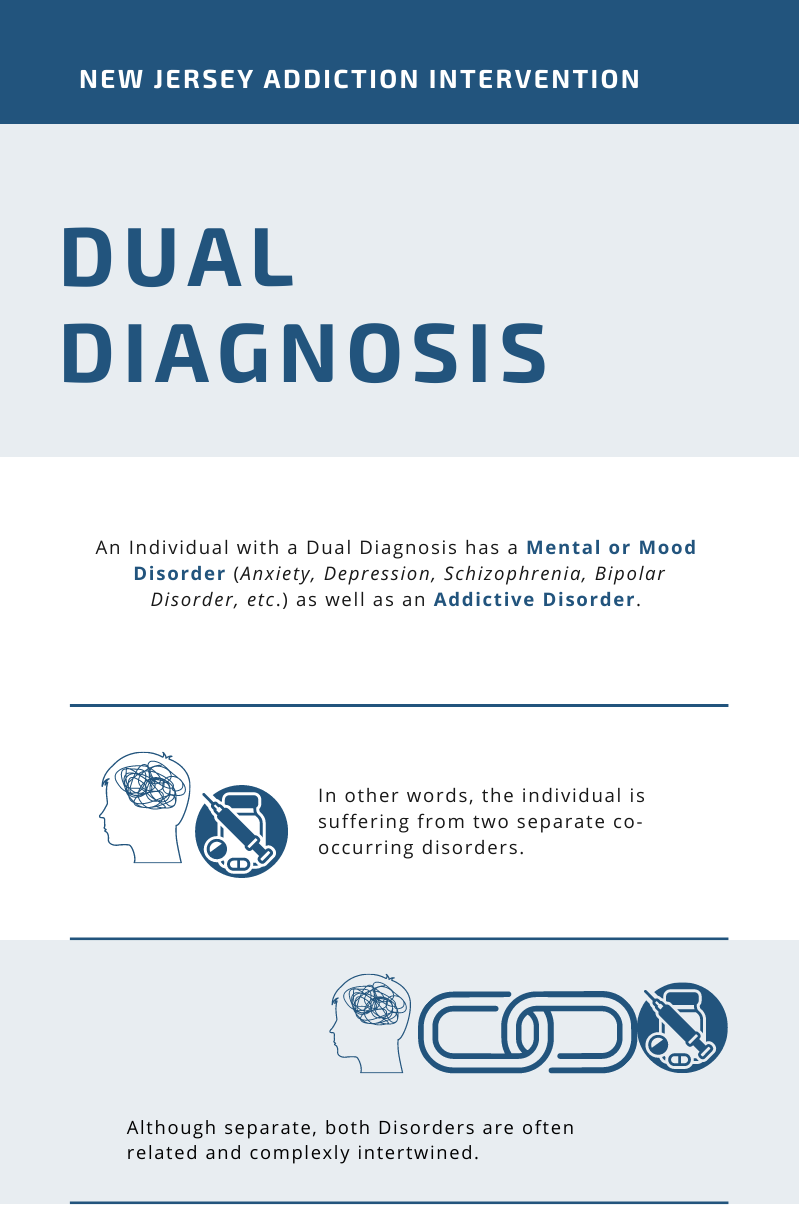By definition, a dual diagnosis is characterized by individuals suffering from a substance use disorder as well as a co-occurring mental health condition. When someone is dealing with a dual diagnosis, professional treatment for the addiction and mental health condition must be performed simultaneously. When this is left untreated, both conditions can begin to exacerbate each other’s symptoms, causing difficult and complex issues to arise. Therefore, if you or a loved one have a dual-diagnosis, it may be time to consider attending a dual diagnosis treatment center in New Jersey.
To fully understand dual diagnosis treatment, you must be aware of the important aspects of recovery associated with co-occurring disorders. Dual diagnosis healthcare providers in New Jersey provide individualized treatment while making sure to educate each patient on the important factors of treatment. Individuals dealing with co-occurring disorders can fully recover from both conditions when they receive the proper care and support.

What is Dual Diagnosis?
Dual diagnosis is a concept that has been medically established and recognized as extremely effective. To explain, dual diagnosis is the name of a practice that treats individuals who suffer from an addiction and psychiatric condition. For example, if an individual suffers from bipolar disorder and becomes addicted to drugs, they are said to have co-occurring disorders and need dual diagnosis treatment.
If you struggle with co-occurring disorders, here are 7 things you need to know about dual diagnosis treatment programs in New Jersey.
#1: Dual diagnosis is extremely common.
In 2014, 20.2 million people in the United States suffered from a substance use disorder. Out of those 20.2 million people, 7.9 million suffered from a mental health condition as well. However, many people who struggle with addiction also have undiagnosed mental conditions that they may be completely unaware of. Unfortunately, co-occurring disorders are far more common than we know.
#2: Certain underlying factors play a role in the development of co-occurring disorders.
There are many factors that can contribute to the development of a dual co-occurring disorders. It is important to understand where your conditions may come from so that you can receive individualized treatment specific to your needs. To begin, certain genetic predispositions can cause mental health conditions or substance use disorders to develop, or at least make an individual more susceptible to experiencing them.
On the other hand, an individual’s personality or environment could make them more likely to suffer from mental illness and addiction. For example, if your personality is centered around being a risk-taker, or being very adventurous and experimental, you may be more susceptible to developing a substance abuse issue. Whatever the case may be, dual diagnosis addiction treatment will help you make a full recovery from each condition.
#3 The mental health condition typically comes first.
While it is possible for drug or alcohol abuse to cause a mental health condition to develop, typically the mental health condition comes first. In other words, it is more common for individuals to suffer from a mental disorder that causes them to self-medicate their symptoms with substances. For example, when individuals tell their stories of recovery, typically they recall suffering from a traumatic event that caused their substance abuse to occur.
#4: Dual diagnosis conditions require dual diagnosis substance abuse treatment.
While this may seem obvious, it is common for individuals with co-occurring disorders to attend addiction treatment centers that fail to address their mental health condition. Unfortunately, only addressing the addiction usually doesn’t provide enough recovery for the individual to remain sober. Therefore, dual diagnosis treatment centers in New Jersey are extremely instrumental in many people’s recovery.
#5: Some treatment centers claim to have a dual diagnosis program when they really don’t.
Unfortunately, like any business that provides a service, there are some treatment centers that only care about the money. As a result, some treatment centers may market as if they include dual diagnosis programs when they actually aren’t equipped to treat mental health conditions. As a result, if you or a loved one are seeking dual diagnosis treatment, make sure to do your research before deciding on a specific rehab center.
Additionally, individuals seeking treatment for co-occurring disorders should contact professional addiction specialists who can provide recommendations for trustworthy treatment programs. Contact our addiction specialists today for more information on how to find a reputable dual diagnosis addiction treatment center in New Jersey.
#6: If you have co-occurring disorders, medical detox is only the first step of treatment.
When your substance abuse or addiction is fueled by mental health issues, ridding the substances from your body is not enough. In other words, completing a drug and alcohol detox program will not resolve the issues that caused, or exacerbated, your issues with addiction. Individuals recovering from a dual diagnosis should continue treatment after completing detox so they receive the proper mental health care that they deserve.
#7: Dual diagnosis treatment may take longer than traditional addiction treatment.
Residential dual diagnosis programs in New Jersey can take longer to complete than regular drug or alcohol rehab. This is because mental health and addiction professionals have to medically assess both conditions and determine a course of action for treating the two issues. Because dual diagnosis includes two conditions that can affect one another, the recovery process tends to take longer when compared to an individual who only suffers from one condition.
For more information on treating mental health and addiction, or to get connected with an addiction treatment provider near you, contact a dedicated healthcare provider today.
Medically Reviewed: August 28, 2020

All of the information on this page has been reviewed and verified by a certified addiction professional.

